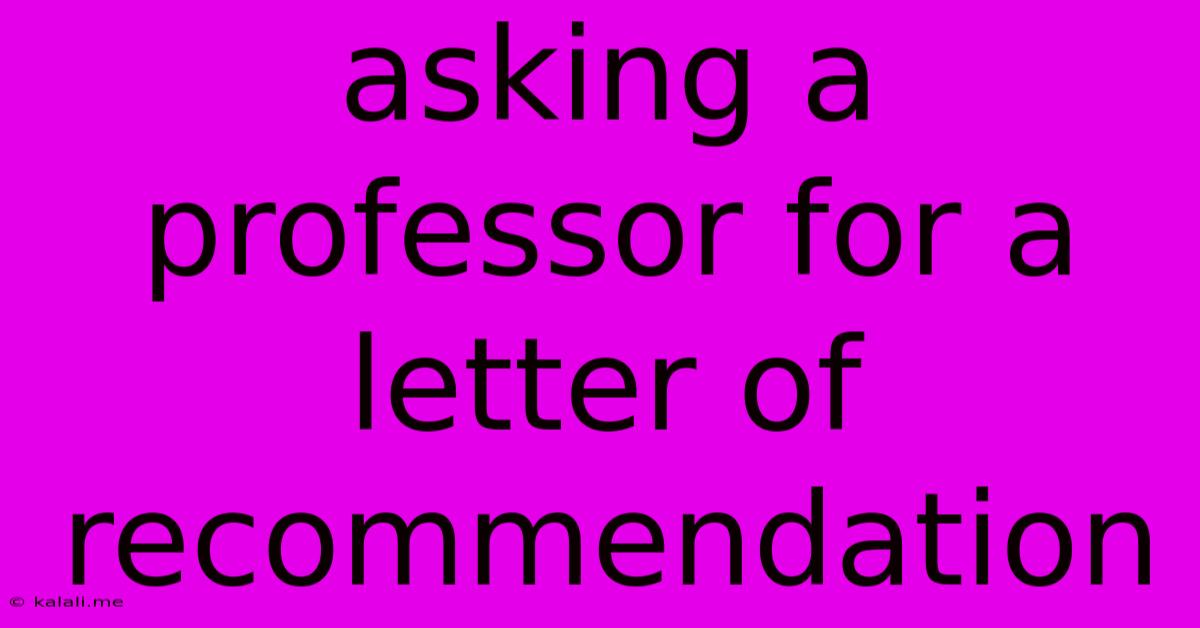Asking A Professor For A Letter Of Recommendation
Kalali
Jun 08, 2025 · 4 min read

Table of Contents
Navigating the Labyrinth: How to Ask a Professor for a Letter of Recommendation
Getting a strong letter of recommendation (LOR) is crucial for graduate school applications, scholarships, and even certain jobs. A well-crafted request can significantly increase your chances of receiving a glowing recommendation. This guide breaks down how to ask a professor for a letter of recommendation effectively, maximizing your chances of success. It's more than just an email; it's a strategic conversation showcasing your preparedness and respect for their time.
Understanding the Professor's Perspective
Before we dive into crafting the perfect request, it's essential to understand the professor's viewpoint. They're busy individuals juggling teaching, research, and administrative duties. A poorly timed or poorly written request can easily be overlooked or, worse, rejected. Therefore, demonstrating consideration for their workload is paramount.
Timing is Everything: When to Ask
Don't wait until the last minute! A reasonable timeframe allows the professor ample time to write a thoughtful and comprehensive letter. Ideally, you should approach them at least two to three weeks, and preferably a month or more, before the application deadline. This gives them time to review your materials, reflect on your performance, and compose a strong recommendation.
Gathering Your Materials: The Essential Toolkit
Before contacting your professor, assemble the following materials:
- Your Resume/CV: This provides a concise overview of your academic and professional achievements.
- Your Transcript: Demonstrates your academic performance.
- A Statement of Purpose (SOP) or Personal Essay: If applicable, this allows the professor to understand your goals and aspirations.
- The Application Requirements: Know precisely what the application requires from the recommender (e.g., specific deadlines, forms, submission portals).
- A List of Your Relevant Accomplishments: Highlight your strongest work, projects, or experiences in their class.
Crafting the Perfect Request: A Step-by-Step Guide
Your request should be professional, concise, and demonstrate your understanding of the professor's time constraints. Consider a combination of email and in-person meeting:
1. Initial Contact (In-Person or Email): A brief email expressing your interest in pursuing [opportunity] and your desire for their recommendation is a good starting point. Schedule a short meeting to discuss the opportunity in more detail. This meeting is crucial for building rapport and gauging their willingness to write.
2. The In-Person Meeting (Crucial): During this meeting, express your gratitude for their time. Reinforce your genuine interest and appreciation for their insights. Briefly discuss your goals and why you believe their recommendation would be valuable. This is your opportunity to answer any questions they might have and to address any concerns regarding your qualifications.
3. The Follow-Up Email (After the Meeting): Send a follow-up email summarizing the meeting and formally requesting the letter. Attach all necessary materials mentioned above. Clearly state the deadline, and provide all relevant application information, including online submission links and any required forms.
4. The Email Template: Use a professional and respectful tone. Here's a template you can adapt:
Subject: Letter of Recommendation Request - [Your Name] - [Application/Opportunity]
Dear Professor [Professor's Last Name],
Thank you again for meeting with me on [date] to discuss my application for [Application/Opportunity]. As promised, I've attached my resume, transcript, statement of purpose, and the application requirements. The deadline for submission is [date].
Please let me know if you are able to write a letter of recommendation for me. I understand your time is valuable, and I appreciate your consideration. If you need anything further from me, please don't hesitate to ask.
Sincerely, [Your Name] [Your Email Address] [Your Phone Number]
Maintaining Communication: Staying in Touch
After sending your initial request, send a follow-up email a week or two before the deadline to check in and offer any additional materials if needed. This demonstrates your proactive nature and respect for their time commitment.
Handling Rejection Gracefully
If the professor is unable to write a letter, accept their response gracefully and thank them for their time and consideration. This professionalism maintains a positive relationship and opens doors for future collaborations.
By following these steps, you’ll significantly improve your chances of securing a strong letter of recommendation that will help you achieve your academic and professional goals. Remember, preparation, respect, and clear communication are key to success.
Latest Posts
Latest Posts
-
Water Dripping From Freezer Into Refrigerator
Jun 08, 2025
-
Does My Phone Have An Ir Blaster
Jun 08, 2025
-
Best Place To Band A Parrot
Jun 08, 2025
-
How To Delete Text Messages On Android
Jun 08, 2025
-
Is It Ok For Cats To Eat Flies
Jun 08, 2025
Related Post
Thank you for visiting our website which covers about Asking A Professor For A Letter Of Recommendation . We hope the information provided has been useful to you. Feel free to contact us if you have any questions or need further assistance. See you next time and don't miss to bookmark.